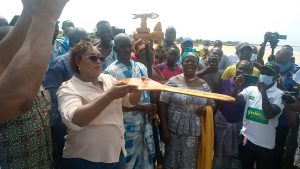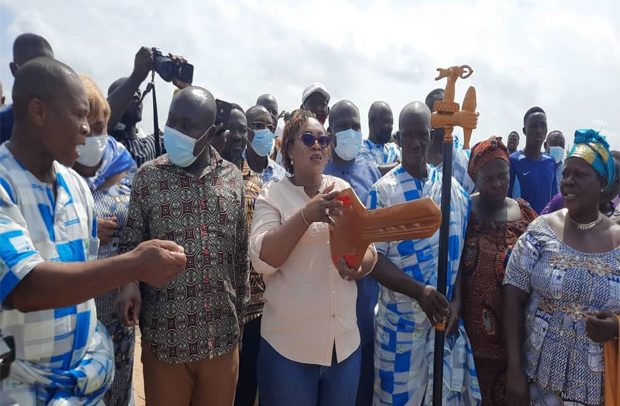The fishing community in Ghana will for the month of July stay away from fishing to restore the dwindling stock of fishes in the water bodies of the country.
The ban which is termed as the closed season covers canoe and inshore (artisanal) fishing as well as industrial fishing.
Artisanal fishers are to observe the ban from July 1, to July 31, 2021 while industrial fishers are to observe it from July 1, 2021 to August 31, 2021.
The ban which was officially announced by the Minister for Fisheries and Aquaculture Development, Mavis Hawa Koomson was commemorated at the Aborigines beach in the Keta Municipality of the Volta Region.
According to a report on the Coastal Resources Centre The term closed season, or biological rest period, refers to the stopping of fishing during the spawning (egg production) period of the fish. The spawning period is usually between July and August.
This is to allow fish eggs to fertilize into baby fishes and grow to a point where they can survive into adult fishes. The rationale is that provided that a sufficient number of fish remain to breed, the “closed season” can, by “protecting the pregnant fish”, increase the stock available for fishing in just a few years.
According to the Fisheries Minister, with the exception of Tuna resources, the marine fishery resources of Ghana were over-exploited due to overfishing and other bad fishing practices. This is so bad that there are indications that some fish species have depleted.
To address the situation, the Ministry and the Fisheries Commission (FC) in accordance with Section 84 (1) of the Fisheries Act, 2002 (Act 625) and the Marine Fisheries Management Plan (2015, 2019) started implementing a closed season in 2016. It was not observed in 2020 due to COVID-19 management measures.
Madam Mavis Hawa Koomson, declaring the closure with a dummy key, stressed that the closed season was necessary in ensuring a reduction in excessive pressure and over-exploitation of fish stocks in the marine sub-sector.
She said, “We need to constantly remind ourselves that the Marine and inland sub-sectors have been confronted with challenges that have the tendency to overturn the benefits from the fisheries sector if no action is taken.
She was hopeful that the sustained implementation of the closed season will enable the sector to recover the fish stock of the country.
As a measure to palliate the impact of the closed season, the Minister also announced that the government would provide some livelihood packages to support the over 20000 fisher folk that may be affected.
She assured that “We have begun a process to ensure that you are supported during this period. We are already in the procurement process, so very soon, within a week or two, you will see us coming round to your regions, your fishing communities to give you something small to take care of your children. We would also come round with some fishing nets to share with you and it tells you that you cannot use the unauthorized net to go fishing.”
The leadership of fisherfolk from the Western, Greater Accra, Central and Volta regions who were present at the ceremony promised to support the initiative.
According to them, the initiative was for their own good as a group and the good of the country as a whole. They, therefore, called on their colleagues to strictly adhere to the ban and stop all bad practices when the season finally opens.
Prior to the official closure of fishing activities, sensitization activities were undertaken across the country to prepare the fisherfolk for the task ahead.
While in the region, Madam Hawa Koomson also led the distribution of some 192 outboard motors to the fishing communities in Ketu South, Keta, and Anloga districts.

From Fred Duodu, Ho (k.duodu@yahoo.com)


